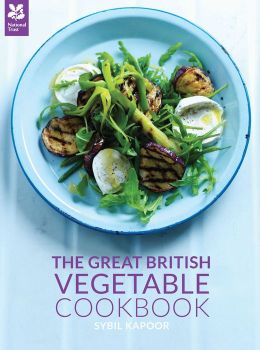 |
| Title: The Great British Vegetable Cookbook Author: Sybil Kapoor Published: August 2013 Publisher: National Trust |
My experience with British cuisine, before reading this book, came from: 1. three weeks spent in England as a teenager on a school trip and 2. the voracious consumption of British novels.
In regards to the school trip, I learned that British people eat:
For breakfast -- Cold, sliced meat (as opposed to warm or hot sliced meat). Boiled eggs that rest in tiny, silver goblets.
For lunch -- Margarine sandwiches. Fish and chips. Very, very fresh fish.
For dinner -- I don't recall, as I've apparently blotted out the memory from my consciousness.
For snacks -- Cake-ish biscuit things called digestives that are incredibly unremarkable.
(Note: Quite possibly, the above perceptions are extremely inaccurate).
In regards to novels, I learned from Jane Austen, Louise Rennison, Dodie Smith, P.L. Travers, & etc. that British people have eaten, and still do eat, mutton, potatoes, white soup (if wealthy), fruit (if wealthy), spoonfuls of sugar, marmalade, lots and lots of toast, and gruel.
What I realized, when examining these impressions, before sliding into The Great British Vegetable Cookbook, was that I knew nothing in regards to British vegetable consumption (also, that I probably knew nothing in regards to everything).
As it turns out, British people eat much the same vegetables as Americans do. Asparagus. Chard. Cucumbers. Peas. Onions. Potatoes. Beans.
One piece of showcased vegetation amazed me, though. Nettles! A type of stinging weed, I gleaned from a brief google search, that enjoys a high level of edibility. I would really like to know how often British people harvest and consume Nettles -- particularly those British citizens who live in rural environments. Are nettles simply included in The Great British Vegetable Cookbook for flair, or do the British regularly consume nettle salad in an uneventful way?
All in all, I've read less interesting cookbooks than The Great British Vegetable Cookbook. To its detriment, the quantity of recipes was thin as a cucumber sandwich. I don't think I have it in me to recommend the book to people who do not make the collection of cookbooks a priority in their lives. However, if one is British, enjoys cooking, and is fond of vegetables, I think this book would be a perfect fit for one's lifestyle. Additionally, if one owns property which is partly used to display a variety of mildly interesting books, this book would not be amiss in such a collection.

No comments: